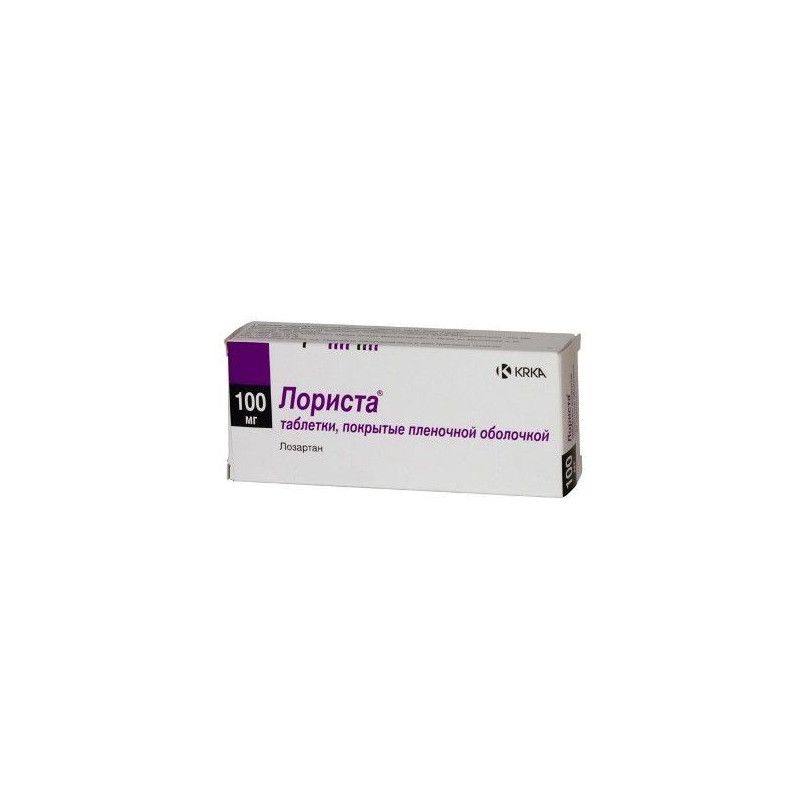



 All payments are encrypted via SSL
All payments are encrypted via SSL
 Full Refund if you haven't received your order
Full Refund if you haven't received your order
90 pcs.
Lorista has a hypotensive effect.
arterial hypertension;
reducing the risk of stroke in patients with arterial hypertension and left ventricular hypertrophy;
chronic heart failure (as part of combination therapy, with intolerance or failure of therapy with ACE inhibitors);
protection of kidney function in patients with diabetes mellitus type 2 with proteinuria to reduce proteinuria, reduce the progression of kidney damage, reduce the risk of end-stage development (preventing the need for dialysis, the likelihood of increased serum creatinine levels) or death.
Hypersensitivity to Losartan or to other components of LORISTA, arterial hypotension, hyperkalemia, dehydration, pregnancy and lactation, age up to 18 years (efficacy and safety have not been established), lactose intolerance, galactosemia or glucose / galactose impaired absorption syndrome.
Carefully: hepatic and / or renal failure, reduced bcc, impaired water and electrolyte balance, bilateral stenosis of the renal arteries or stenosis of the artery of a single kidney.
Lorista is taken orally, regardless of the meal.
Frequency of admission - 1 time per day.
Arterial hypertension: The average daily dose is 50 mg. The maximum antihypertensive effect is achieved within 3-6 weeks of therapy. In some patients, it is possible to achieve a more pronounced effect by increasing the dose of the drug to 100 mg / day in 2 or 1 dose.
While receiving large doses of diuretics, it is recommended to start Lorista therapy with 25 mg / day in 1 dose.
Elderly patients, as well as patients with impaired renal function, including patients on hemodialysis, do not require correction of the initial dose.
There is no need to adjust the dose to elderly patients or patients with impaired renal function, including patients on hemodialysis.
Patients with impaired liver function should be prescribed lower doses of the drug.
Chronic heart failure: The initial dose is 12.5 mg / day in 1 reception. In order to achieve the usual maintenance dose of 50 mg / day, the dose of the drug must be increased gradually, at intervals of one week (for example, 12.5; 25 or 50 mg when taken once a day). Lorista is usually prescribed in combination with diuretics and cardiac glycosides.
The dose of the drug should be increased according to the following scheme:
1st week (1st to 7th day) - 1 tab. 12.5 mg / day.
2nd week (8–14th day) - 1 tab. 25 mg / day.
3rd week (15–21st day) - 1 tab. 50 mg / day.
4th week (day 22–28) - 1 tab. 50 mg / day.
In most cases, Lorista is well tolerated, side effects are mild and transient, and do not require discontinuation of the drug.
Hemic and lymphatic: Infrequently - anemia, Schönlein-Genoch disease.
Allergic reactions: less than 1% - urticaria, skin rash, itching, angioedema (including laryngeal and tongue edema, causing airway obstruction and / or swelling of the face, lips, pharynx).
Nervous system: with a frequency of 1% or more - dizziness, asthenia, headache, fatigue, insomnia; less than 1% - anxiety, insomnia, drowsiness, memory disorders, peripheral neuropathy, paresthesia, hypoesthesia, migraine, tremor, ataxia, depression, syncope, tinnitus, impaired taste, visual disturbances, conjunctivitis.
Cardiovascular: Orthostatic hypotension (dose-dependent), palpitations, tachy- or bradycardia, arrhythmias, angina pectoris, vasculitis.
Urogenital: with a frequency of less than 1% - imperative urge to urinate, urinary tract infections, renal dysfunction, decreased libido, impotence.
On the part of the respiratory system: with a frequency of 1% or more - nasal congestion, cough *, infections of the upper respiratory tract, pharyngitis, dyspnea, bronchitis, swelling of the nasal mucosa.
From the digestive tract: with a frequency of 1% or more - nausea, diarrhea *, dyspepsia *, abdominal pain; less than 1% - anorexia, dry mouth, toothache, vomiting, flatulence, gastritis, constipation, hepatitis, abnormal liver function.
Dermatologic: with a frequency of less than 1% - dry skin, erythema, photosensitivity, increased sweating, alopecia.
Musculoskeletal system: with a frequency of 1% or more - cramps, myalgia *, pain in the back, chest, legs; less than 1% - arthralgia, arthritis, pain in the shoulder, knee, fibromyalgia.
Laboratory values: hyperkalemia; infrequently - a moderate increase in the level of urea and serum creatinine; very rarely - increased activity of liver enzymes, hyperbilirubinemia.
Other: gout.
The “*” mark indicates side effects, the incidence of which is comparable to placebo.
In the dark place at a temperature of no higher than 25 ° C.
